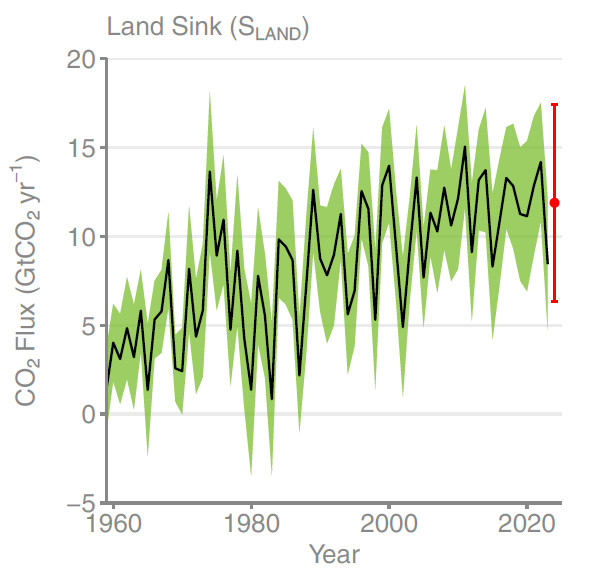There have been reports that the land sink collapsed in 2023.
We find a big drop in 2023, in line with what is expected during an El Niño.
As the El Niño subsides, the land sink is expected to rebound back towards the trend line in 2024, though with large uncertainties.
5/
We find a big drop in 2023, in line with what is expected during an El Niño.
As the El Niño subsides, the land sink is expected to rebound back towards the trend line in 2024, though with large uncertainties.
5/

Comments
6/
With record emissions of CO2 emissions, a record increase in atmospheric CO2 is expected, amplified by the El Niño conditions.
7/
Even if we miraculously start immediate global mitigation, the chances of getting to net zero CO2 emissions before crossing 1.5°C are vanishingly small.
8/
It is evident to anyone paying attention that even today's ~1.4° C warming is catastrophic, and we have no pathway below this, for centuries.
Our top priority should be to bring the planet back into energy balance. Aerosols are not a solution, but can buy us time.
“Sustainable development” is a monumental oxymoron.
Is #climateadaption the only realistic solution - leaving millions less well off people at risk?
🌍🌊🤔
https://sites.google.com/view/thejourney2050
* Sources: Fossil & LUC emissions
* Sinks: Ocean & land uptake, atmospheric
The land & ocean sinks continue to take up 55% of the CO2 we put in the atmosphere, amazingly stable given the stuff we dump into the atmosphere.
9/
* LUC is a direct human intervention (cut down a tree, grow a tree, land abandonment, forestry, etc)
* Sink is an indirect response to changing temperature & co2 concentration. It is not directly caused by humans, but by plants that like eating CO2!
[We have a paper Monday...]
Lots of material available:
* Paper: https://essd.copernicus.org/preprints/essd-2024-519/
* Website: https://globalcarbonbudget.org/
* Figures with data download: https://robbieandrew.github.io/GCB2024/
10/10
Less global shipping, less aviation, electric vehicles, solar and nuclear generation, heat pumps. How would economies change?